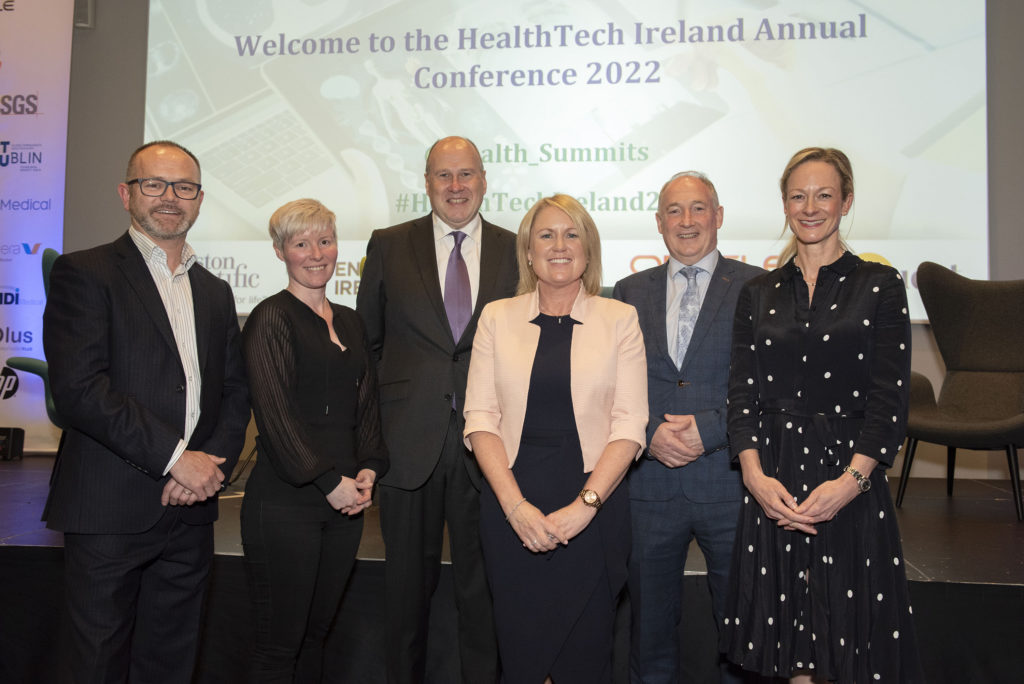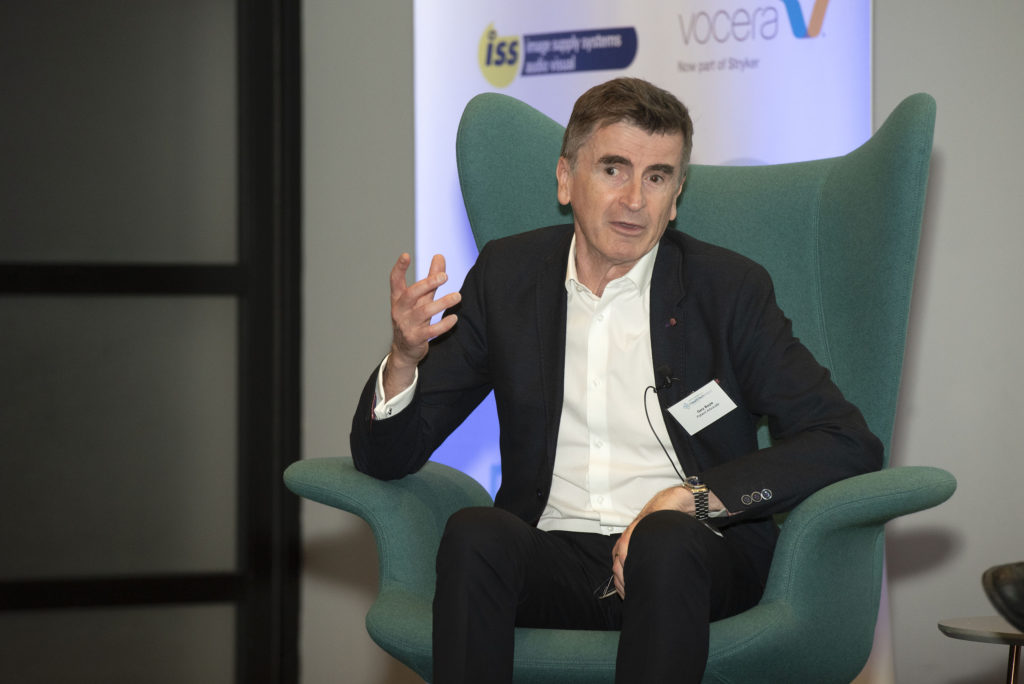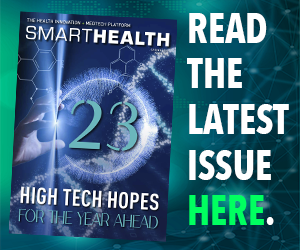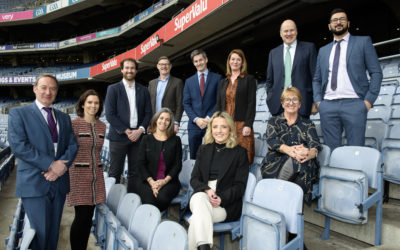>>> This year HealthTech Ireland Association turns 40. Founded in 1982 as a forum for the development and advocacy of policies supporting innovation, the association is an independent trade body for manufacturers, developers and distributors of technology products and solutions to the Irish health system. Nine months into her role as HealthTech Ireland’s new CEO Susan Treacy outlines the digital challenges and opportunities that lie within our complex health ecosystem <<<
How has Healthtech Ireland and its members overcome challenges during its 40 year history?
In the first few decades, change in health technology was more incremental with sustaining innovation and solutions fitting into the system. Changes were adopted, adapted to or challenged. Connection was at times a challenge and silos existed across the sector. This decade is very different. In this forth industrial revolution, we have never had more medtech companies, more rapid adoption of solutions for patients and more connectedness. The medical device sector, which was pretty much the entirety of health tech 40 years ago is now valued at €750million. While digital health was not a concept when we were founded, it now matches the device sector in scale.
HealthTech Ireland’s membership and focus reflects this evolution. We have had to manage that growth. It’s meant expanding our organisation, broadening our board, establishing more working groups to address the new challenges and, always, building new relationships. The sector has grown to such a scale that we now represent 140 companies and growing. Notably, a positive shift I’ve seen in the past decade or so has been a move towards patient centred products and solutions. This is both in terms of having patients involved in product and solution design and also in the ability to have patients moved from care in an acute setting to the community, and at home if possible. We can see this with Stay Left, Shift Left tying into Sláintecare.
It is important for patients to be in the conversation and part of the solution – they experience a perspective we only try to imagine. Given we have gone from one crisis to another in recent years, organisations are creating the capability to be dynamic and agile. With the nature of work now changed, good leadership and management with a clear purpose and vision is vital. We must ensure employees have the capability and resource to be effective and remove obstacles to allow them be agile. Organisations are now also looking further ahead strategically. By having longer preparedness, we create a robustness and resilience in our healthcare system.
What has surprised or encouraged you most about your role as CEO to date?
I have worked in many facets of healthcare and so, to be honest, not much surprises me. The response to the pandemic was noticeably different with all teams – public and private – laser focused on finding solutions to protect and care for the public. Members worked around the clock with public sector teams securing PPE, respirators and other vital equipment for our healthcare system as well as strengthening our various supply lines.
Areas like diagnostics ensured PCR testing was up and running safely in unprecedented short timelines. What was also impressive was how widespread, rapid and safe, vital interventions in digital health proved to be. For example remote dialysis patient monitoring and the new tracing app – both vital to the work of the HSE and NPHET – were fully operational in six weeks. That said, we need to improve on digital health adoption. Ireland is a hotbed for medtech supported by a young, highly-technical workforce yet we are so far behind in certain areas such as digital health.
Many across healthcare, including myself and the HealthTech Ireland board and members, are encouraged and motivated that with a post-pandemic cultural shift to more trust and collaborative solution finding, if we continue to leverage our capabilities we can continue to evolve for the better. This is being echoed across the sector with organisations like Enterprise Ireland, HSE Digital Transformation Group, the Hospital Transformation teams, Health Innovation Hub Ireland and of course HealthTech Ireland.
To borrow a line from Henry Ford: ‘Coming together is a beginning, staying together is progress and working together is a success.’ I’d like to make sure that health technology companies and the HSE continue to work together and continue to find ways to do so quickly and safely.

Mark Coffey, Senior Director International Accounts Johnson & Johnson Med Tech, EMEA; Clare Harney, CEO, HD Health, Ivan Yates, Conference Chair; Susan Treacy, CEO, HealthTech Ireland Association; John Swords, National Director, HSE Procurement and Katrin Ostwald, Senior Business Development Manager, WifOR. Photo by Maura Hickey
Can technology transform the delivery of healthcare in Ireland?
Technology alone cannot transform the delivery of healthcare in Ireland. It requires, among other things, trust, leadership, connecting, pathways and engagement. This is why we deliberately picked the theme of our conference this year ‘Connecting for Health Transformation’. By leveraging the skillsets and product and service knowledge across academia, the public and private sector, we gain insights, solutions, services, processes and the capability to offer the value of what technology can provide to clinicians and patients.
Ireland is a hotbed for medtech with 14 of the 15 top global companies having operations here. Enterprise Ireland reports medtech is responsible for €13billion in exports to over 100 countries. Being the size we are and being the second largest European exporter we are punching well above our weight! Enterprise Ireland reports we employ over 45,000 people across 350 companies.
Our members have the knowledge and expertise here in Ireland to lead in digital transformation. Sadly though, we are last in Europe for telehealth alongside Serbia and Romania. There is clearly more to be done. But the future is bright. The pandemic demonstrated what can be achieved together. There is a plethora of work being carried out to keep the momentum going. The HSE Digital Transformation team are working across the sector with a digital health innovation strategy Stay Left, Shift Left, which aligns with Sláintecare strategy in keeping people well or if unwell then at home in the community and if in an acute setting moving them to community and home.
Digital health solutions enable this much more rapidly. HeathTech Ireland, as a member of the National Digital Health Leaders Steering Committee, is also part of a national movement of support to help realise the vision of a leapfrog to a paperless, community and home-based care that has the patient at its core. There are challenges in that the healthcare system must continue to operate while facing additional arising issues, but overall we are moving in the right direction.
When it comes to data and digital solutions in healthcare systems, what are the biggest challenges right now?
A significant barrier to overcome was an acknowledgement that we cannot regress to the pre-pandemic norm. We saw huge progress made in an emergency and learned that there are now a range of new, reliable ways of doing things. Gradually we are embracing these new practices and learning how to make them even more reliable and safe. Despite this, we know there are still many unmet clinical needs for patients. This global challenge of patient access to healthcare is not easy to solve.
We are moving to a more targeted approach and digital health greatly enables this. What is fundamental is working across the healthcare sector to provide the capability for all patients to access innovative solutions. This is a responsibility we all have in healthcare and one which industry and our healthcare organisations are working on.
In Ireland, of course, we also need to recognise that we have some enormous advantages. We have some of the largest companies in health technology operating here. We have some of the nimblest and most capable medium and small scale manufacturers and service providers anywhere. We host most of the major operators in both the pharma and IT sectors, allowing us access to expertise unrivalled. And we have a solid data protection regime that ensures our patients are properly prioritised. So, our second biggest problem is understanding just how far we can go. World leadership in this area is entirely possible for Ireland.
What are your thoughts on future collaboration between private and public sectors when it comes to delivering healthcare in Ireland?
Collaboration requires respect, trust and a focus on the same desired outcome. What the pandemic and the cyber security attack demonstrated was that both public and private sectors were most concerned about how the patient would fare. Both sector areas demonstrated they had the same motivation. There is now a resolve in the sector, which I hope will continue, to keep this shared understanding and momentum going. HealthTech Ireland is working hard on this with other willing stakeholders. The more strategic, thought out and well-executed collaboration we have, the more success there will be for healthcare here.
What is femtech’s potential as an industry disruptor?
With Ida Tin first coining the term in 2016, femtech has grown exponentially and shows no signs of stopping. Femtech innovation represents women’s needs in every facet of health. It is estimated by 2027 the market will be worth $65.3billion dollars. This is not surprising considering it is targeting the previously unmet needs of 50 per cent of the population. There is also growing diversity in femtech companies with 20 per cent led by men.
It is widely acknowledged that product development has lacked diversity considerations in the past, whethe it is in clinical trials, seat belt design, AI development or healthcare products. Meeting the needs of this market is wonderful to see, however what I find equally impressive is that femtech is supporting women in removing stigmas around women’s health. We are talking about the issues more openly, with citizens at the centre of the conversation. This can only be a good thing.
The UK’s NHS is aiming to be the world’s first net zero national health service, how do you view this from an Irish perspective?
Michelle Sullivan from the HealthTech board, Boston Scientific and sustainability lead at the Association of British HealthTech Industries, alongside our sustainability working group has extensive experience on this from both sides. As an example, something that resonated from her talk at our recent conference was that the NHS write into tender requirements to cut down on plastics. Ireland has an opportunity like this to examine how we can use products that eliminate plastics where possible.
This will, in turn, affect how products are manufactured and designed. Michelle also points out the responsibility is with all of us. Often, if products are needed quickly they’re flown in by air to support medical clients. However, if we plan together and set out guidelines then these will be able to come in by road. Without doubt this is a challenge that we will all need to pull together on. I am delighted that HealthTech Ireland members and partners across healthcare are already working on a body of work around this together.
What excites you most in the healthcare arena in Europe?
The possibilities and opportunity to leverage knowledge and best practice. Unfortunately, in Ireland we are behind in seeing healthcare as an investment, particularly when we consider the immense possibilities of preventative medtech. We are ranked among the lowest in Europe for benefiting from digital transformation. Yet in this is a huge opportunity to lean in and learn what has been successful for our neighbours. HealthTech Ireland as a member of MedTech Europe and the Global MedTech Alliance is learning from countries and feeding information back in through our working groups and cross sector engagement.
Industry can support this evolution and with future challenges this is necessary. There are wonderful examples of countries such as Estonia who digitally transformed their healthcare many years ago. Denmark is a great example of a country that embraced and invested in value-based healthcare. Value-based healthcare looks out to the horizon, considers the broader ecosystem and impacts and demonstrates value to the system, to the governments and most of all value to patients. It’s not about spending more it’s about evolving the system and processes to realise the benefits.
Who is impressing you most in healthcare globally right now?
There are so many leaders in healthcare today raising the bar of what is possible for patients and elevating quality of care and dignity for patients. I am a fan of the Gates Foundation and the approach that they apply to tackling global health issues. So what is impressing me globally? The positive shift in society post-pandemic that healthcare matters.
We have seen what is possible in a few years and it is worth the investment both financially and in providing resource and capability to ensure we create the capability to meet unmet clinical needs across many diseases and illnesses. A lasting impact in healthcare was our engagement with technology in general. We all got to know what Zoom or Teams are. There is an opportunity here in terms of us being exposed to digital solutions as a society and this will help support and empower patients as digital health grows.
What is HealthTech Ireland’s main focus for the next year?
We are a members’ organisation and so our focus is on supporting our members and helping them with challenges they face. HealthTech Ireland is also a trusted facilitator. To enable effective healthcare transformation whether in digital health, through devices or diagnostics, trusted collaboration and engagement is critical. We have become the ideal gateway to come together with industry to share ideas, find solutions and to build relationships. We achieve this through the outputs we have from 40 years of collaboration, through the act that members sign up to a code of ethics and through our memorandums of understanding with many organisations here today, including the HSE.
Part of the transformation story is of course the amazing innovative products, solutions and services that are created and available from our members. Having worked for 25 years in many roles involved in implementing healthcare solutions and services, transformation also means understanding and supporting the processes and pathways necessary such as procurement, regulation and supply chains that ultimately enable these solutions safely reach patients.
True and sustainable healthcare transformation though must also have broader considerations, such as defining value and, of course, sustainability. We have also just completed a body of work reviewing the organisation, our processes and our working groups. This will ensure HealthTech Ireland is suitably set up to meet the future needs of our member’s and have the optimum impact to this complex healthcare ecosystem.
ANATOMY OF A CEO
How did your early experiences shape you as a health leader today?
For me, it has always been about the patient. Perhaps this came from my wanting to be a doctor and working as a biomedical scientist. This connection has never left me. More recently I see family and friends needing the healthcare system more. My mother was diagnosed with a rare neurological, degenerative disease MSA-C. Seeing her bravery and openness to use any technology to manage her disease and knowing what is available, drives and inspires me to facilitate engagement to accelerate improvement the system in the best way I can.
Trust and integrity are also a huge part of my identity. Having worked for over 20 years in healthcare with some great global brands, I have been involved in implementing large innovative projects involving clinicians, scientists, procurement and business managers working together over long periods of time and bringing the teams those changes that provide improvements and benefits to all. Returning a few months in when it’s all settled is great – when the benefits are really realised. These projects have been invaluable as they taught me the importance of everyone having a voice and input, and of considering the risks and challenges.

Gary Boyle at the HealthTech Ireland conference 2022
What speech has made the most impact on you?
Rather than try to pick the greatest of all time I’d like to highlight one of the best I’ve heard recently. Gary Boyle spoke at our recent annual conference last. He’s a wonderful patient advocate, a member of the Irish Digital Health Leadership Steering Group (IDHLSG) and Parkinson’s patient. If you define a good speech as one said at the right time by the right person then his fits perfectly. His call to action to the sector reinvigorated a room full of our members, healthcare professionals, CEOs and civil servants all of whom were recovering
from the workload created by the pandemic. He helped us all reconnect with and understand better the most important piece of the healthcare equation – our patients. When it comes to reading, I like authors with practical information. I have read most of Amy Webb’s books and was impressed by the tangible advice Clay Christensen’s pieces provide around disruptive technology.
What’s the most valuable lesson you’ve learned?
We are all here for a moment. In that headspace we can consider the impact we want to have on this system that is going to take care of our families and friends and ourselves. Healthcare is a hugely complex sector with complex challenges. Collaboration and engagement is vital. Listening to perspectives and strategically working through areas we can contribute, is vital. Listening too, to the needs of the sector, the different perspectives and the patient. Resilience as with most areas of life is critical to success.






